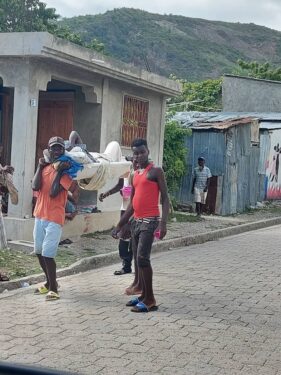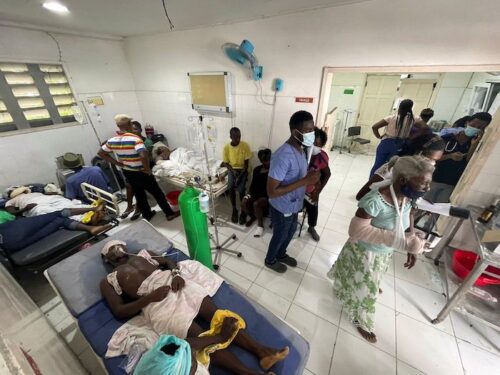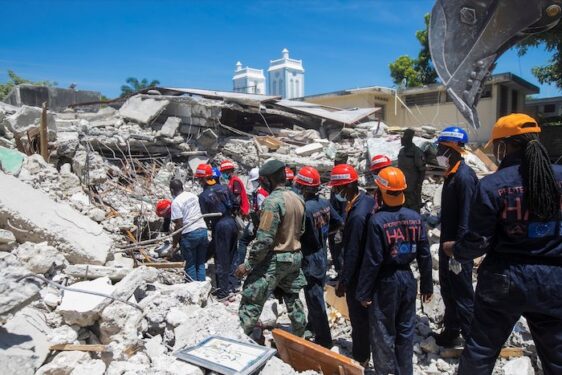NEW YORK — When Dr. Fonie Pierre looks around the streets of Les Cayes the word that comes to her mind is “desolation.”
“No businesses are open. People are in the streets. There is no shelter,” Pierre, head of the Catholic Relief Services Les Cayes office told The Tablet. “There are needs for food, water, every basic need.”

The death toll from the 7.2 magnitude earthquake that hit the city on Saturday, Aug. 14 was at almost 1,500, with another 7,000 reported injured, and tens of thousands left homeless as of Tuesday. By Aug. 17, the death toll reached over 1,900. Homes, churches, and schools are among the buildings left in rubble.
Even for those whose homes survived, Pierre said concerns for an aftershock still exist, which stranded people outside as the Caribbean nation braced for Tropical Depression Grace. By 5 p.m. on Monday, heavy rains ran through the island with winds that topped out at 35 mph — just short of tropical storm status.
Days out from the earthquake, prelates and priests in the U.S. with connections to Haiti called the devastation of the earthquake “heartbreaking” for a nation that has endured so much — including a 7.0 magnitude earthquake in 2010 (that killed 220,000, injured 300,000, and displaced an estimated 1.5 million people), Hurricane Michael that struck in 2016, and the assassination of President Jovenel Moïse last month.
Archbishop Thomas Wenski of Miami said he spoke with Bishop Joseph Decoste of Jérémie and Archbishop Launay Saturné of Cap-Haïtien, who were both unharmed. However, Archbishop Wenski said both reported that church buildings and diocesan schools were destroyed.
Cardinal Chibly Langlois of Les Cayes, the first Haitian cardinal, has non-life-threatening injuries. At the time of the earthquake a priest that was with him at the priestly residence was killed along with two other employees.
Father William Konicki, the pastor of the Catholic Community of Sacred Heart Parish in Hopedale, Massachusetts, that twins with St. Gerard’s Parish in Les Cayes told The Tablet that St. Gerard pastor Father Claude Renel Elysée told him the church is destroyed and the condition of the mission house is uncertain.
Father Konicki corresponded with people in Les Cayes over the weekend but lost communication without a way for them to charge their phones. He said they were using “farming equipment, pickaxes, shovels, and machetes to lift heavy concrete debris.”

“We prayed at all of our Masses this weekend for the people of Haiti, and especially at our twin parish because we visited them, we know who they are, it just feels like our hands are tied and it’s very frustrating,” Father Konicki said. “I’m thinking about why do bad things happen to good people and they’re just wonderful people, satisfied with simple things in life.”
Pierre said right now they’re still evaluating the situation and participating in coordination meetings with the Haitian government and the United Nations. They’re also trying to distribute hygiene kits, kitchen kits, and some supplies for temporary shelters they have in their warehouse.
Figuring out how to handle the medical reports is a challenge because a lot of people have orthopedic injuries that can’t be treated due to a lack of supplies, she added. And as someone who was in Haiti when the 2010 earthquake struck, Pierre said there will be fewer injuries and deaths this time because the population of Les Cayes is less dense and the buildings are smaller compared to Port-au-Prince, although there’s a new set of logistical challenges.
“In Port-au-Prince, there is the capacity to receive materials from any country very fast,” Pierre said. “Then in Les Cayes, with the gang situation, it’s very difficult for the help to come.”
The gangs control certain areas and block the roads preventing supplies from getting through, Pierre explained. The people are fearful of using the roads for the same reason, along with a fear of possible landslides.
The CRS official said as relief efforts continue, she hopes to see better coordination from the international community. IsraAID a humanitarian international non-government organization, and USAID are two organizations that have sent emergency relief teams.
“For now, we will see many physicians, many nurses, but they are coming and doing nothing because there are no materials,” Pierre said. “We also have the COVID-19 that is existing. Now, to manage all of the orthopedic cases, then to have COVID-19, with the gang situation, with the social, political situation, with a lack of coordination, it’s very difficult.”
Hardly anyone in Haiti has received a COVID-19 vaccination.

Archbishop Wenski said the church has to have a long-term response to Haiti and let the U.S. government and others handle the rescue operations in the short term.
“We have to be there when they go away,” Archbishop Wenski said. “We’re going to have a continuing role with the engagement with the local church in Haiti, and our engagement has to be to help that local church and be in a position to be able to continue to serve its people.”
The Archdiocese of Miami is accepting donations. The United States Conference of Catholic Bishops recommended people donate to CRS on Aug. 14. The Catholic Medical Mission Board, the Catholic Agency for Overseas Development, and Caritas Internationalis are other organizations that are collecting monetary donations for Haiti.
Father Enrique Camacho, director of Caritas Puerto Rico, said they’re collecting monetary donations that will go directly to Caritas Haiti. Father Camacho traveled to Haiti 11 times to help it recover after the earthquake in 2010.
Father Camacho said he doesn’t have plans to travel to the Caribbean nation because unlike 2010 Caritas Haiti wasn’t affected and can provide relief. He noted, however, that he will do whatever they need because he remembers how scary these situations are from being in Haiti in 2010 and experiencing an earthquake in Puerto Rico last year.
“I feel heartbroken because these people are suffering so much right now,” Father Camacho said.
Father Reginald Jean-Mary of Notre Dame d’Haiti Catholic Church in Miami told The Tablet that his message to the Haitian parishioners at Mass this past weekend was that it’s time to be prayerful and come together for the people of Haiti.
“This is not the time to blame anybody. This is not the time to complain. This is not the time to blame God. This is the time for all of us to come together,” Father Jean-Mary said. “As people of faith, we have to come to the realization that God is not there to punish his children and as people of faith and hope that gives us strength to believe that it cannot stay the way it is, that there will be a new day for Haiti one day.”
Bishop Gerald Barbarito of Palm Beach noted how the Haitian community is “filled with a vibrant faith and dedication to the Lord,” and so Catholics should “through the Church show our support and our concern and offer whatever we can from the diocese in that regard.”
Editor’s Note: For full coverage on the situation in Haiti, head to Haiti Earthquake 2021
